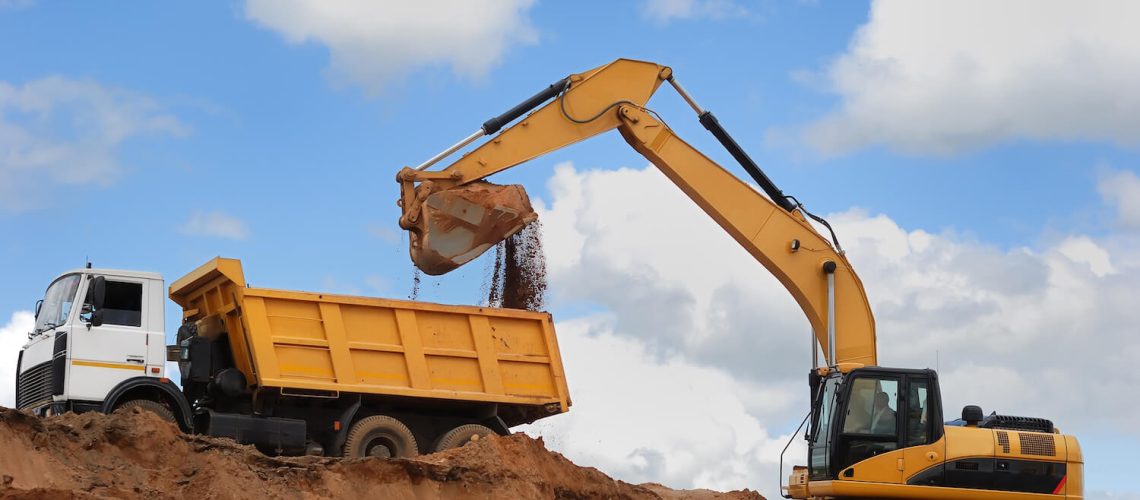Excavation is a fundamental activity in construction and civil engineering, serving as the cornerstone of numerous projects. Whether you’re building a foundation for a skyscraper, creating a trench for utility lines, or shaping a landscape for a new roadway, excavation plays a pivotal role. However, the success of excavation doesn’t solely depend on the skill of the operators and the power of the heavy machinery; it also relies on the proper coordination and utilization of support equipment. One such piece of support equipment that stands out in the excavation process is the dump truck.
Dump trucks, often seen rumbling around construction sites, are unsung heroes in the world of excavation. These versatile vehicles are essential in transporting and disposing of excavated materials, making excavation projects efficient, safe, and cost-effective.
In this article, we will dig deeper into the world of dump trucks and understand their heavy role in excavation.
The Anatomy of a Dump Truck
Before we delve into the role of dump trucks in excavation, it’s essential to understand their basic structure. Dump trucks are specialized vehicles designed for transporting various materials, most commonly earth and rocks, from one location to another within a construction site or for waste disposal.
They are characterized by several key components that enable them to perform their tasks effectively.
- Cab: The cab is the front section of the dump truck where the driver operates the vehicle. It contains the steering wheel, dashboard, and various controls for driving, turning, and tipping the load.
- Dump Bed: The dump bed, also known as the bed or box, is the most prominent feature of a dump truck. It’s a large, open container that can be hydraulically tilted to unload its contents. The capacity of the dump bed varies between different models and can range from a few cubic yards to over 20 cubic yards, depending on the size of the truck.
- Chassis: The chassis is the framework of the dump truck, connecting the cab and dump bed. It supports the weight of the load and provides structural integrity to the vehicle. The chassis is designed to withstand the considerable stress and impact experienced during the loading and unloading process.
- Axles and Wheels: Dump trucks typically have multiple axles and a set of wheels on each axle to distribute the load and provide stability. The number of axles can vary, with larger trucks having more axles to support heavier loads.
- Engine: The engine powers the dump truck and provides the necessary torque and horsepower to move heavy loads. Dump trucks are equipped with powerful engines to ensure they can transport materials efficiently.
- Hydraulic System: The hydraulic system is responsible for raising and lowering the dump bed. It’s a critical component that allows the operator to control the unloading process safely.
Dump Trucks in Excavation: A Multifaceted Role
Dump trucks play a multifaceted role in excavation projects, and their functions can be divided into several heavy key areas.
- Transportation of Excavated Material: One of the primary functions of dump trucks in excavation is the transportation of excavated material. As excavation equipment such as excavators, backhoes, and bulldozers dig and collect earth, rocks, or debris, the dump trucks come into action. They receive the load from the excavation machinery, transport it to a designated area within the construction site, and then dump the material. This process allows for the efficient removal of excavated material from the working area, preventing clutter and enhancing safety.
- Capacity and Efficiency: Dump trucks come in various sizes and capacities, allowing construction and excavation professionals to choose the right truck for the job. Smaller dump trucks are suitable for smaller excavation tasks, while larger ones are designed for more extensive projects. The efficiency of these vehicles lies in their ability to carry substantial quantities of material in a single trip, reducing the need for multiple trips and the associated time and fuel costs.
- Flexibility and Maneuverability: Dump trucks are highly maneuverable vehicles that can access various terrains and tight spaces, which is particularly important in excavation. They can navigate uneven and rugged terrain, reaching areas that might be inaccessible to other types of transportation equipment. This flexibility is essential for projects that involve digging and moving materials in challenging environments.
- Safety and Precision: Dump trucks are equipped with safety features and controls that allow for precise unloading of materials. Operators can control the speed and angle of the dump bed, ensuring that materials are unloaded with accuracy and without causing safety hazards. Additionally, dump trucks are designed to distribute the load evenly, reducing the risk of tipping or instability during unloading.
- Waste Disposal: In addition to transporting excavated materials within the construction site, dump trucks are also used for waste disposal. Construction sites generate a significant amount of waste, including debris and unusable materials. Dump trucks play a crucial role in removing this waste and transporting it to designated disposal sites, such as landfills or recycling centers.
Types of Dump Trucks
Dump trucks come in several different configurations, each designed for specific purposes within excavation and construction. Understanding these types can help project managers make informed decisions about the most suitable dump truck for their needs. Here are some common types of dump trucks:
- Standard Dump Truck: This is the most common type of dump truck, characterized by a single dump bed behind the cab. It is versatile and used for a wide range of excavation tasks, from small to large projects.
- Articulated Dump Truck: Articulated dump trucks are designed with a hinge between the cab and the dump bed, allowing for greater maneuverability on uneven terrain. They are often used in mining and large-scale excavation projects.
- Transfer Dump Truck: A transfer dump truck has a separate trailer with a second dump bed that can be detached and used independently. This design increases the overall load capacity and offers greater flexibility.
- Super Dump Truck: Super dump trucks are equipped with additional axles, providing increased load capacity. They are popular in situations where weight limits are a concern, such as hauling materials over long distances.
- Side Dump Truck: Side dump trucks are unique because they can dump their load to the side rather than the rear. This feature makes them useful for dumping materials along narrow or confined spaces, such as highway median strips.
- Off-Highway Dump Truck: Off-highway dump trucks are massive, heavy-duty vehicles designed for extreme off-road conditions, often found in mining and quarry operations. They can carry massive payloads and navigate challenging terrains.
Optimizing Dump Truck Operations in Excavation
To ensure the efficient and safe work use of dump trucks in excavation projects, several best practices and considerations should be taken into account.
- Proper Load Management: It’s essential to load dump trucks properly to avoid overloading or underloading. Overloading can strain the vehicle and pose a safety risk, while underloading can lead to unnecessary trips, wasting time and fuel. Precise measurement and load planning are crucial.
- Regular Maintenance: Like any heavy machinery, dump trucks require regular maintenance to operate efficiently. This includes checking the engine, hydraulics, tires, and brakes to ensure they are in good working condition. Routine maintenance minimizes the risk of breakdowns during critical excavation tasks.
- Operator Training: Skilled operators are vital for the safe and efficient use of dump trucks. Proper training ensures that operators understand the vehicle’s capabilities, safety procedures, and best practices for loading and unloading materials.
- Safety Measures: Safety is a top priority in any construction or excavation project. Dump trucks should be equipped with safety features such as backup cameras, audible warning systems, and other technologies to help prevent accidents. Additionally, the work area should be well-marked, and clear communication between operators and ground personnel is essential.
- Environmental Considerations: Dump trucks contribute to the environmental footprint of construction projects, mainly through fuel consumption. Choosing fuel-efficient models, optimizing routes to reduce fuel consumption, and recycling or reusing excavated materials can help minimize the environmental impact.
- Advanced Technology: Some modern dump trucks are equipped with advanced technologies such as GPS systems and telematics. These systems help project managers track the location and performance of dump trucks, enabling better resource allocation and real-time decision-making.
The Environmental Impact of Dump Trucks
While dump trucks are indispensable in excavation and construction projects, they do have a notable environmental impact. Construction activities, including excavation, can generate air and noise pollution, disrupt local ecosystems, and contribute to carbon emissions. It is essential to mitigate these impacts through environmentally conscious practices:
- Emission Reduction: Modern dump trucks are designed to meet stringent emission standards, and some even use alternative fuels like natural gas or electricity to reduce their carbon footprint.
- Noise Abatement: Noise pollution from dump trucks can be minimized by implementing noise barriers and limiting construction activities during sensitive hours.
- Dust Control: Construction and excavation activities often produce dust, which can have negative health and environmental effects. Using water trucks to control dust and employing dust control measures can mitigate these issues.
- Recycling and Reusing Materials: Whenever possible, excavated materials should be recycled or reused on-site. This reduces the need for additional materials to be transported, reducing the environmental impact.
- Energy-Efficient Practices: Efficient route planning, maintenance, and load management can all contribute to reducing the energy consumption of dump trucks.
Challenges and Future Innovations
As construction and excavation technology continues to evolve, so do the challenges and opportunities associated with dump trucks. Some of the challenges in the industry include the rising costs of fuel and maintenance, strict environmental regulations, and a growing demand for more sustainable construction practices.
In response to these challenges, the construction and truck manufacturing industries are exploring innovative solutions. Some of the emerging trends and innovations in the world of dump trucks include:
- Hybrid and Electric Dump Trucks: Electric and hybrid dump trucks are becoming more prevalent, offering reduced emissions and lower operating costs. These vehicles use battery technology to power electric motors, resulting in quieter and more environmentally friendly operation.
- Autonomous Dump Trucks: The construction industry is increasingly adopting autonomous and semi-autonomous dump trucks. These vehicles can operate without a human driver, potentially improving safety and efficiency while reducing labor costs.
- Advanced Materials and Design: Lightweight materials and aerodynamic design enhancements are being incorporated into dump truck manufacturing to improve fuel efficiency and reduce the environmental impact.
- Telematics and Data Analytics: Dump trucks are being equipped with advanced telematics systems that provide real-time data on vehicle performance. This data is used for predictive maintenance, route optimization, and fuel efficiency improvements.
Conclusion
In the world of excavation, dump trucks are unsung heroes that play a critical role in making construction projects a reality. They are the workhorses responsible for transporting excavated materials, maintaining efficiency, and ensuring the safe and precise unloading of heavy loads. As technology continues to advance, dump trucks are evolving to meet the challenges of the modern construction industry, offering more sustainable and efficient solutions.
Understanding the anatomy, types, and best practices for using dump trucks in excavation is essential for project managers and construction professionals. With the right knowledge and equipment, excavation projects can be executed with greater precision, safety, and environmental responsibility, ensuring a brighter and more sustainable future for the construction industry. As dump trucks continue to evolve, they will remain at the forefront of excavation, digging deeper into the earth to build a better world above ground.

